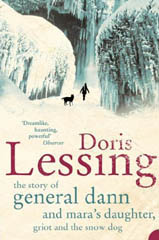An Eye on Our Future
 The notion that technology is bringing nature into our power is one of the contemporary vanities brought under oblique scrutiny in Doris Lessing’s The Story of General Dann and Mara’s Daughter, Griot and the Snow Dog. A fable set in the distant future, perhaps thousands of years hence, it is couched in raw-boned, angular prose clearly intended to show kinship with oral storytelling. But this device doesn’t quite come off. The pared-back plainness of style sporadically descends into clumsiness and the novel’s sprawl begs for pruning, as does its title.
The notion that technology is bringing nature into our power is one of the contemporary vanities brought under oblique scrutiny in Doris Lessing’s The Story of General Dann and Mara’s Daughter, Griot and the Snow Dog. A fable set in the distant future, perhaps thousands of years hence, it is couched in raw-boned, angular prose clearly intended to show kinship with oral storytelling. But this device doesn’t quite come off. The pared-back plainness of style sporadically descends into clumsiness and the novel’s sprawl begs for pruning, as does its title.
That’s not to say that Lessing’s vision lacks interest or pertinence. She paints a bleak landscape, geographically, spiritually and culturally, and shows the planet locked into climate cycles that radically alter habitats and biodiversity. One implication seems to be that, whatever our collective address to global warming, there are other triggers to the process beyond the imperfect stewardship of the human race.
To the north, ‘Yerrup’ is an arctic desert. To the south, ‘Ifrik’ is a burning dust bowl, equally inimical to human survival. Destroyed and decaying habitats extrude endless lines of refugees treading desperate paths into probable servitude. They flit like ghosts from war zone to war zone, straggling towards the misty miasma of treacherous marshes on the coastal fringe.
This novel is a sequel to Mara and Dann, which saw the brother and sister, the last of the royal Mahondi line, kidnapped as children to be used as a breeding pair. Their escape ensued in a perilous journey, during which they left childhood and innocence behind. Now Dann, whose Mahondi blood and exploits as a boy warlord have invested him with hero status, travels north with the aim of seeing the Ice Cliffs of Yerrup with his own eyes. Like Odysseus, he traverses an archipelago of islands strung across the Middle Sea. Each primitive community is marked by a sense of group identity that all too readily curdles into violence against those who do not ‘belong’.
Dann becomes an accomplished teller of tales, exchanging stories for shelter and food. He rescues a puppy from the icy waters and this wise snow dog, as may be expected, becomes his devoted companion. The animal’s true-hearted loyalty and the directness of its affections act as a foil to Dann’s tortured psyche. A breakdown overtakes him on his return to the Centre, where he learns that Mara has died in childbirth. Intensely lonely and riven with self-hatred, he struggles with his shadow self, which he calls ‘the Other One’, and is driven into the illusory comforts of ‘poppy’. Here Lessing intends to mirror the spiritual influenza of the present age and to press home the point that one thing we are always up against is human nature.
Griot, a youthful acolyte as faithful as the dog, and envious of its place in Dann’s affections, masks his leader’s collapse and organises the influx of refugees into a ragged army whose token of belonging is the red blanket worn like a plaid. The gathering enemy adopts a black blanket to announce its identity. Again without direct comment, Lessing invites us to consider the relation between the male and military dress, discussed so acutely by Virginia Woolf in Three Guineas.
Besides such correspondences with the world we know, it is the absence of so many things we take for granted that is striking. No electronic communications, no good maps, no railways, no medicine beyond the crudest herbalism. The fires of Dann’s inner hell are fuelled by his impotent awareness that much knowledge has been lost. The Centre is housed in a vast, rotting museum, set up when the civilisations of Yerrup collapsed. It was meant to preserve knowledge, but instead its artifacts are inscrutable, the materials and technologies that constructed them utterly lost to time. Before the encroaching mud forces everyone to abandon the place, squads of transcribers capture fragments of text from the books stored there, and Mara’s daughter, Tamar, creates a House of Memory in her mind for fractured shards of information that may one day make some sense. This sequence resonates with the broadcast accounts of the looting and destruction of libraries and museums in modern Iraq, where, as in Dann’s world, the exact extent of the loss may never be known. However poignant this may be, Lessing is giving a firm reminder that the transmission of knowledge is in a constant state of entropy, and to believe otherwise is folly.
This review of The Story of General Dann and Mara’s Daughter, Griot and the Snow Dog first appeared in the Sunday Herald.
©Jennie Renton 2006

Comments